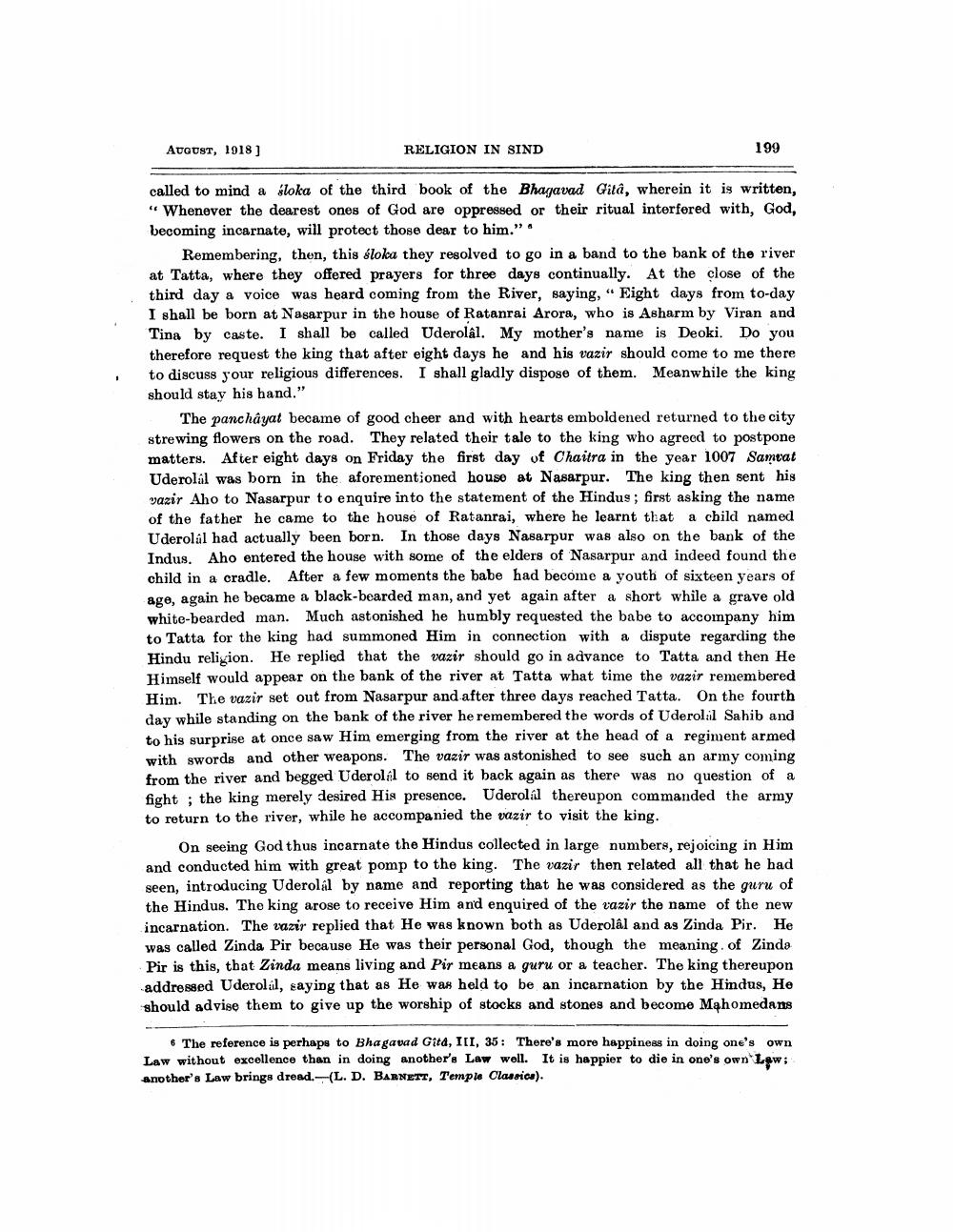________________
August, 1918)
RELIGION IN SIND
199
called to mind a sloka of the third book of the Bhagavad Gitâ, wherein it is written, " Whenever the dearest ones of God are oppressed or their ritual interfered with, God, becoming incarnate, will protect those dear to him."
Remembering, then, this sloka they resolved to go in a band to the bank of the river at Tatta, where they offered prayers for three days continually. At the close of the third day a voice was heard coming from the River, saying, "Eight days from to-day I shall be born at Nagarpur in the house of Ratanrai Arora, who is Asharm by Viran and Tina by caste. I shall be called Uderolâl. My mother's name is Deoki. Do you therefore request the king that after eight days he and his vazir should come to me there to discuss your religious differences. I shall gladly dispose of them. Meanwhile the king should stay his hand."
The panchayat became of good cheer and with hearts emboldened returned to the city strewing flowers on the road. They related their tale to the king who agreed to postpone matters. After eight days on Friday the first day of Chaitra in the year 1007 Samrat Uderolál was born in the aforementioned house at Nasarpur. The king then sent his vazir Aho to Nasarpur to enquire into the statement of the Hindus ; first asking the name of the father he came to the house of Ratanrai, where he learnt that a child named Uderolal had actually been born. In those days Nasarpur was also on the bank of the Indus. Aho entered the house with some of the elders of Nasarpur and indeed found the child in a cradle. After a few moments the babe had become a youth of sixteen years of age, again he became a black-bearded man, and yet again after a short while a grave old white-bearded man. Much astonished he humbly requested the babe to accompany him to Tatta for the king had summoned Him in connection with a dispute regarding the Hindu religion. He replied that the vazir should go in advance to Tatta and then He Himself would appear on the bank of the river at Tatta what time the vazir remembered Him. The vazir set out from Nasarpur and after three days reached Tatta. On the fourth day while standing on the bank of the river he remembered the words of Uderoleil Sahib and to his surprise at once saw Him emerging from the river at the head of a regiment armed with swords and other weapons. The vazir was astonished to see such an army coming from the river and begged Uderoll to send it back again as there was no question of a fight , the king merely desired His presence. Uderolál thereupon commanded the army to return to the river, while he accompanied the vazir to visit the king.
On seeing God thus incarnate the Hindus collected in large numbers, rejoicing in Him and conducted him with great pomp to the king. The vazir then related all that he had seen, introducing Uderolal by name and reporting that he was considered as the guru of the Hindus. The king arose to receive Him and enquired of the vazir the name of the new incarnation. The vazir replied that He was known both as Uderolâl and as Zinda Pir. He was called Zinda Pir because He was their personal God, though the meaning of Zinda
Pir is this, that Zinda means living and Pir means a guru or a teacher. The king thereupon addressed Uderoleil, saying that as He was held to be an incarnation by the Hindus, He should advise them to give up the worship of stocks and stones and become Mąhomedans
6 The reference is perhaps to Bhagavad Gitá, III, 35: There's more happiness in doing one's own Law without excellence than in doing another's Law well. It is happier to die in one's own Low; another's Law brings dread. (L. D. BARNETT, Temple Classica).




